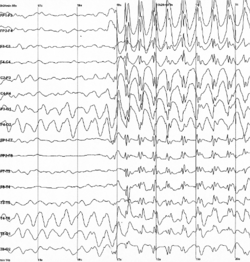Seizure
An epileptic seizure (colloquially a fit) can be described as a brief episode of signs and/or symptoms which are due to abnormal, excessive, or synchronous neuronal activity in the brain.[1] The outward effect can vary from uncontrolled jerking movement (tonic-clonic seizure) to as subtle as a momentary loss of awareness (absence seizure).
The following list contains a more comprehensive set of symptoms:
- Losing consciousness and then exhibiting confusion afterwards.
- Having uncontrollable muscle spasms which often result in falling.
- Drooling or frothing at the mouth.
- Jaw clenching and tongue biting.
- Having sudden, rapid eye movements.
- Making unusual noises, such as grunting.
- Losing control of bladder or bowel function.
The disease of the brain characterized by an enduring predisposition to generate epileptic seizures is known as epilepsy,[1][2] but seizures can also occur in people who do not have epilepsy. Depending on the cause, epilepsy is generally treated with anticonvulsant drugs such as diazepam and pregabalin.
Seizures are most commonly induced under the influence of withdrawals from prolonged chronic benzodiazepine or alcohol usage. However they can also occur under the influence of moderate dosages of stimulants, certain opioids, synthetic cannabinoids, and the 25x-NBOMe series of psychedelics.
Psychoactive substances
Compounds within our psychoactive substance index which may cause this effect include:
- 1B-LSD
- 1P-LSD
- 1V-LSD
- 1cP-AL-LAD
- 1cP-LSD
- 1cP-MiPLA
- 2-FA
- 25B-NBOH
- 25C-NBOH
- 25C-NBOMe
- 25D-NBOMe
- 25E-NBOH
- 25I-NBOH
- 25I-NBOMe
- 25N-NBOMe
- 2C-E
- 3-Cl-PCP
- 3-HO-PCE
- 3-HO-PCP
- 3-MMC
- 3-MeO-PCE
- 3-MeO-PCP
- 3C-E
- 3C-P
- 4-AcO-DMT
- 4-AcO-DiPT
- 4-FA
- 4-HO-MET
- 4-HO-MiPT
- 6-APB
- A-PHP
- A-PVP
- AL-LAD
- ALD-52
- DMT
- DOC
- DOI
- Datura
- ETH-LAD
- Flunitrazolam
- GBL
- GHB
- JWH-018
- LSD
- LSM-775
- MDA
- MDMA
- MXiPr
- Mescaline
- Methamphetamine
Experience reports
Annectdotal reports which describe this effect with our experience index include:
See also
External links
References
- ↑ 1.0 1.1 Fisher, R. S., Emde Boas, W. van, Blume, W., Elger, C., Genton, P., Lee, P., Engel, J. (April 2005). "Epileptic seizures and epilepsy: definitions proposed by the International League Against Epilepsy (ILAE) and the International Bureau for Epilepsy (IBE)". Epilepsia. 46 (4): 470–472. doi:10.1111/j.0013-9580.2005.66104.x. ISSN 0013-9580.
- ↑ Fisher, R. S., Acevedo, C., Arzimanoglou, A., Bogacz, A., Cross, J. H., Elger, C. E., Engel, J., Forsgren, L., French, J. A., Glynn, M., Hesdorffer, D. C., Lee, B. I., Mathern, G. W., Moshé, S. L., Perucca, E., Scheffer, I. E., Tomson, T., Watanabe, M., Wiebe, S. (April 2014). "ILAE official report: a practical clinical definition of epilepsy". Epilepsia. 55 (4): 475–482. doi:10.1111/epi.12550. ISSN 1528-1167.
